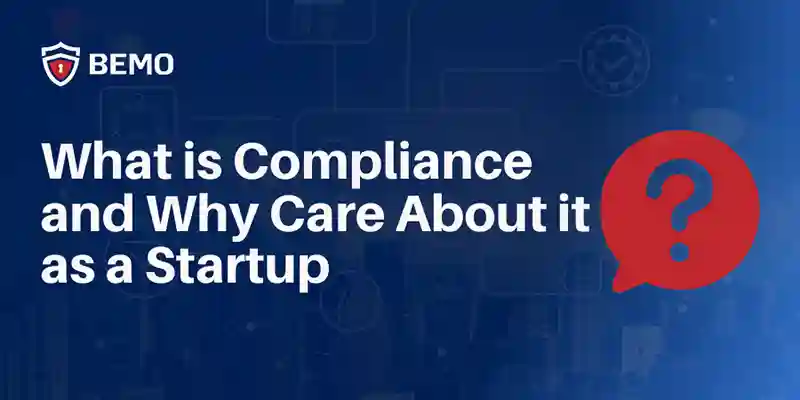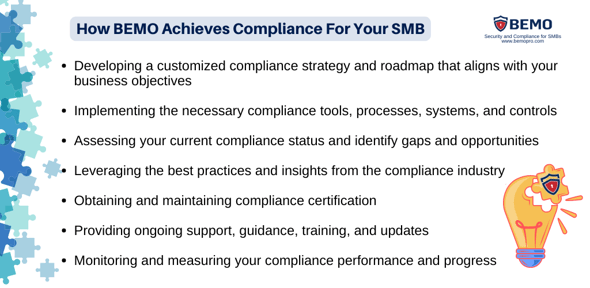6 min read
What is Compliance and Why Startups Should Care About It
Suzanne Phillips
on Jul 07, 2023

If you're a small or medium-sized business owner, you might be puzzled about compliance. What does it mean, and why should you care? You might think that compliance is something that only big corporations have to worry about. Or maybe you are concerned about it, but you don't have the resources or the time to deal with the complex and constantly changing regulations and standards, so you’ve put it on the back burner.
In this blog post, we demystify compliance and explain why it is important for SMBs to prioritize it. We will also show you how using a trusted partner can help you solve the compliance puzzle and achieve your business goals. Finally get the answers to these questions:
- What is Compliance?
- Why is Compliance Important
- Why do SMBs Need to Prioritize Compliance?
- How to Achieve Compliance for Your SMB
What is Compliance?
Compliance is a term that is thrown around a lot in the business world, but what exactly does it mean? Compliance refers to the act of conforming to established rules, regulations, and laws.
These rules and regulations can come from various sources, such as the government, industry associations, customers, suppliers, or even your own internal policies. In other words, it's the process of ensuring that your business is following all the necessary guidelines and protocols to operate legally and ethically.
Compliance is like a puzzle: it can be hard to figure out, but it's satisfying when you complete it. But what if you don't have all the pieces, or you don't know how to put them together? Or worse yet, a 1000 piece puzzle of 100 Dalmatian dogs that is all black and white! That's when compliance can become a headache for small and medium-sized businesses (SMBs).
 Compliance may seem like just another bureaucratic hurdle to overcome, but it's a crucial aspect of running a successful business.
Compliance may seem like just another bureaucratic hurdle to overcome, but it's a crucial aspect of running a successful business.
Effective compliance begins with understanding the compliance requirements for your industry per location. Here are 4 common compliance frameworks that may apply to your business:
Compliance Frameworks
-
HIPAA
The Health Insurance Portability and Accountability Act was introduced as a standard for handling healthcare data.
This regulation applies to medical facilities and other businesses that deal with health data.
HIPAA requires companies dealing with sensitive health data to protect it from unauthorized access, including cybersecurity threats.
-
ISO 27001
ISO 27001 is a global benchmark that demonstrates an elective Information Security Management System (ISMS) for U.S. businesses selling to customers outside of the country.
Visit our ISO-27001 Page for more information
-
SOC2
American Institute of Certified Public Accountants standardized framework that proves a company’s security posture to prospective customers. BEMO offers Type 1 and Type 2:
- Type 1 reports provide an opinion on whether the service organization’s controls are suitably designed to meet the relevant trust services criteria.
- Type 2 reports on the design and operating effectiveness of controls over a period of time (usually 6 months).
Visit our SOC 2 Page for more information
-
NIST 800-171
The National Institute of Standards and Technology follows requirements for protecting the confidentiality of controlled unclassified information (CUI) for those working with the U.S. government.
Why Is Compliance Important?
We get this question fairly often: "why is compliance important for my small business?"
Maybe you think it’s only for big, transnational companies—but that’s not true. If you want to play in the big leagues, your SMB needs compliance too. Or maybe you see it as just another admin task with no real-world impact. In reality, compliance is designed to keep you secure, protect customer trust, and help you avoid costly compliance violations.
In the following video, we break down the benefits of compliance, and the consequences of non-compliance—all in a clear, straightforward way.
Why Do I Need Compliance?
Think of compliance like getting your driver’s license for the first time—can you just walk into the DMV, say you're a great driver, and get your license on the spot? Of course not. You must prove it through an evaluation. While the process might be inconvenient, it’s necessary to ensure safety and prevent accidents.
Compliance works the same way.
Whether you're pursuing SOC 2, CMMC, NIST, ISO, or HIPAA, you can’t just claim your business is secure—you need to prove it to a third-party auditor.
Otherwise how can you truly know if your defenses are strong enough to keep cyber threats from slipping through and compromising your data—or your customers’?
What Are the Risks of Non-Compliance?
Now, you might be thinking: "Can't I just skip it? I’m confident our systems are good."
Our advice? Don’t risk it.
Just like driving without a license, if you get caught, the consequences are severe. Failing to comply with security frameworks could cost your business in fines, penalties, or lawsuits—not to mention the damage to your reputation and losing business.
And beyond the financial risks, overconfidence can leave you underprepared, making you an easy target for cyberattacks.
Compliance isn’t just a box to check— or a nice badge to show off --it’s a commitment to security and trust.
Don’t dread compliance—let BEMO handle the details while you focus on growing your business. We want you to be secure. We want you to be successful. We want you to be more.
Compliance might seem overwhelming, but today, there are modern solutions that make the journey easier and more affordable for small businesses. Compliance as a Service (CaaS) providers like BEMO bring expertise in deploying and monitoring the right controls, ensuring you get compliant and stay compliant over time—without you having to dive into the technical details.
While the upfront investment isn’t cheap, it’s exactly that: an investment in your business’s future. Avoiding costly fines, securing bigger deals, and building long-term trust far outweigh the initial cost. Smart businesses don’t see compliance as an expense—they see it as a competitive advantage.
Why do SMBs need to prioritize compliance?
We are seeing a trend at BEMO – more and more of our customers are seeking compliance. Some factors that are driving SMBs (small and medium-sized businesses) to seek compliance are:
.png?width=1080&height=1080&name=5%20Reasons%20to%20be%20Compliant%20(1).png)
-
Competitive advantages and opportunities for innovation and growthCompliance regulations are often put in place to level the playing field between businesses. By complying with these regulations, SMBs can demonstrate that they are operating on the same level as their larger competitors. This can help level the playing field and give SMBs a chance to compete in their respective industries, while building a reputation that will attract investors and help secure bank credit.
-
Rising cyber threats and risks of data breaches and fines
As technology continues to advance, data breaches have become an increasingly common occurrence. Compliance regulations help ensure that businesses are taking the necessary steps to protect customer data and prevent breaches. By complying with regulations, SMBs can improve their data security and prevent costly data breaches.
-
Increasing regulatory requirements and standards in various industries and markets
One of the most significant reasons for SMBs to comply with regulations is to avoid legal penalties. Non-compliance can lead to hefty fines, legal action, and even the shutdown of your business. By following the rules, you can avoid these costly consequences and protect your business's reputation.
-
Growing customer and partner expectations and demands for data security and privacy
Customers and partners want to do business with companies that they can trust. Complying with regulations sends a message to your customers that you are a responsible and trustworthy business. This can help build loyalty and increase customer satisfaction.
-
Improve Business Processes
Complying with regulations and standards can help SMBs improve their business processes. Many regulations and standards require businesses to implement good practices when it comes to data management, security, and risk management. Implementing these practices can help SMBs improve their overall business resilience and create a culture of trust within the company by promoting transparency and accountability among employees while streamlining efficiency.
How to Achieve Compliance for your SMB
Compliance can seem like a daunting puzzle with many pieces that need to fit together. You may feel like you don't have the time, resources, or expertise to figure it out on your own. You may also feel like you don't have a clear picture of what the completed puzzle should look like. Unlike larger businesses, SMB owners lack the luxury of a dedicated compliance team. Learning and keeping up with constantly changing federal, state, and local regulations pulls time away from the core business focus.
That's where a trusted partner, like BEMO, that specializes in managing security and compliance can help. BEMO can help you achieve compliance by:
BEMO’s main goal is to enable SMBs to enjoy the benefits of security and compliance without the hassle!
Wrap-up
In conclusion, compliance is crucial for SMBs because it helps them avoid legal penalties, build trust with customers, improve data security, and stay competitive. By prioritizing compliance, SMBs can ensure that their businesses are operating legally and ethically, which can lead to long-term success.
A trusted partner can help you solve the compliance puzzle by providing you with a clear vision, a comprehensive plan, and a reliable execution. They can also help you use compliance as a strategic advantage rather than a burden. Compliance is not something you can afford to ignore or postpone. It is a vital part of running a successful business in today's complex and dynamic environment.
BEMO can partner with your SMB to achieve and maintain security and compliance in the Microsoft Cloud with ease. We handle it all, from managing the necessary security and compliance controls, the entire audit process, getting your certification, ongoing monitoring and maintenance, and all the other details.
We will provide you with the tools and solutions you need to achieve and maintain compliance. Whether you need to comply with SOC 2 (Type 1 and 2), ISO 27001, NIST 800-171, HIPAA, or another standard, BEMO can help you simplify and streamline your compliance processes.
Don't let compliance puzzle you - let us help you put the pieces together. Download our Compliance Solutions Brief for details.
Top 10 Posts
-
Google Workspace to Office 365 Migration: A Step-by-Step Guide
-
Office 365 MFA Setup: Step-by-Step Instructions
-
How to Migrate from GoDaddy to Office 365
-
Migrate From Gmail to Office 365: 2024 Guide
-
CMMC Meaning : A Comprehensive Guide for Startups
-
How to remove Office 365 from GoDaddy (tips and tricks)
-
What is Microsoft Purview ? Your A to Z Guide to Getting Secure Fast
-
What is The CIA Triad?
-
How to Set Up Office Message Encryption (OME)
-
What are the 4 types of Microsoft Active Directory?



Leave us a comment!